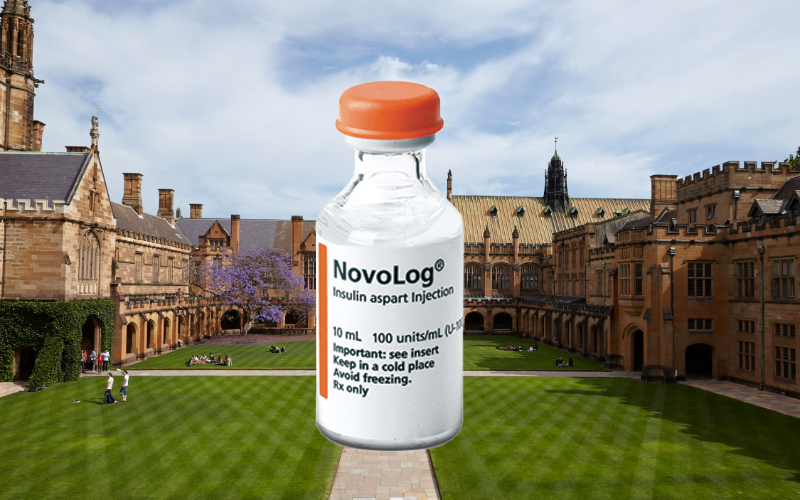Sydney University has stonewalled claims of failing to police serious conflicts of interest in its academic research which may have benefited Big Sugar and Big Pharma companies such as Novo Nordisk. Who knew what and when, asks Andrew Gardiner.
The veil of secrecy around Jennie Brand-Miller – star nutrition academic and for years the face of low glycemic index (‘low GI’) diets – has been lifted, and it’s far from flattering. After months of obstruction, MWM can now confirm that ‘GI Jennie,’ as she’s affectionately known, has been married to John Miller (for decades until 2013, the medical director at Novo Nordisk Pharmaceuticals Australasia) from the late 1980s through to at least 2017.
Why does this matter? Economist and bane of Big Pharma and Sydney University, Rory Robertson, believes GI Jennie – who popularised sugary, high-carb (“low GI”) diets as somehow lowering blood sugar – helped cause a “public health disaster” of high blood sugar, obesity and rampant type two diabetes (T2D) among Australians, in turn generating a market for Novo Nordisk, the leading seller of insulin used to treat T2D.
Robertson insists that dozens of Brand-Miller’s ‘peer-reviewed’ published papers are based on erroneous and/or misconstrued data and that other, more credible studies associate sugary, high-carb diets with high blood sugar, obesity and T2D, stating that:
it has been known at the highest level of medical science and by competent GPs for a century that no-sugar, low-carbohydrate diets “reverse” or “fix” T2D.
A conflict of interest?
The central point of this investigation is not that Brand-Miller acted in bad faith but that her employer Sydney University, despite being notified many times by Robertson, failed to ensure that the academic complied with university policy on disclosing conflicts of interest, namely her close, very close association with a company which derived financial benefits from selling diabetes medication.
Brand-Miller did not declare what was a serious conflict of interest over the 2011 paper at the centre of this controversy, The Australian Paradox, despite enjoying what Robertson calls “a major multi-decade boost to her household income from her life/financial partner (John Miller’s) high-level employment driving Novo Nordisk’s diabetes drug sales.”
MWM is not suggesting the Millers have acted unethically or allowed any personal relationship to affect their professional work, but it should be noted that Novo Nordisk, the 23rd most valuable company in the world with a profit of $US22.24B for the year ending March 2023, appears not to have been displeased with the scholarly work.
For his part, John Miller also failed to openly acknowledge his marriage to Brand-Miller – despite clear conflict of interest implications – when it was his turn to write a PhD dissertation at UNSW in 1989. Miller was already working for Novo Nordisk’s predecessor at the time, and his PhD was co-supervised by a Dr J C Brand.
That’s right, readers: in a triumph of arms-length academic integrity, John Miller’s supervisor was none other than his spouse, Jennie Brand-Miller. MWM confirmed the pair’s collaboration and marriage via documents helpfully available online (the latter has since mysteriously vanished from the University of Sydney’s website).
“Amazingly, John Miller acquired a UNSW PhD and ‘expert’ status under the (hidden) ‘supervision’ of his own wife while embedded in the Human Nutrition Unit at the University of Sydney, with the Unit’s taxpayer-funded facilities gifted to him by his wife’s boss, Stewart Truswell – notably, the main scientific author for decades of our influential Australian Dietary Guidelines – all while Miller was employed by CSL-Novo, soon to be Novo Nordisk Australasia,” Robertson told MWM.
Robertson says the Millers’ union has long been ‘common knowledge’ around the corridors of Sydney University’s Human Nutrition Unit and the Charles Perkins (medical research) Centre (the latter subsumed the former from 2012), yet the university appears to have given Brand-Miller what he calls:
a decades-long free pass to hide her links to Novo Nordisk and its predecessors, allowing her to carefully exclude it from conflict-of-interest disclosures she published in hundreds of formal diet-and-health papers, in clear violation of university policy.
“The global nutrition, scientific and medical communities are still haplessly unaware that Brand-Miller’s sugary ‘low-GI’ diet research was conducted under the cloud of the Novo Nordisk conflict,” he added.
A (sugar) scandal in the making?
With their marriage confirmed, we can sum up what appears to be a hitherto insoluble headache for public health, government waste and academic integrity. Jennie Brand-Miller: (a) popularised sugary, high-carb “low GI” diets, (b) wrongly, in the eyes of many, exonerated sugar as a key driver of Australia’s diabetes/obesity epidemic, and (c) may have derived a financial benefit as she and her husband made money from the latter’s work in a company which sells the (insulin) T2D drug treatment.
This could turn out to be a massive scandal … if anyone will listen, says Robertson.
He wants a new, independent inquiry into Sydney University academics’ links to Novo Nordisk, claiming they’re a party to years of scientific malpractice that significantly benefits Big Pharma and the sugar industry. He persists in the face of what seems like systematic stonewalling from the University, which MWM also experienced when researching this story.
Confronted with documents confirming the Millers’ marriage and financial relationship, the university’s media office had a one-line response: “I’ve checked, and our statement from last year stands,” media manager Rachel Fergus wrote. That earlier statement, sent to MWM last July, was that “for over a decade (Robertson) has made … public claims about a number of our researchers and their scientific work (and) any matters have been appropriately, repeatedly and thoroughly examined … with no evidence of any misconduct found”.
Perhaps the lack of action by the university is where the misconduct lies. Is it not the responsibility of esteemed public institutions to ensure their researchers adhere to ethical and compliance guidelines?
Sydney University ‘examination’
One wonders how Sydney University can claim it “thoroughly examined” the matter when startling documentary evidence of massive conflicts was right under its proverbial nose. Earlier recommendations following a 2014 inquiry by Professor Robert Clark – that Brand-Miller’s Australian Paradox be “sent to the shredder” and replaced by a new paper prepared for publication, “in consultation with the Faculty, that specifically addresses and clarifies the key factual issues examined in this Inquiry” – were not meaningfully addressed. And there was little media attention.
Neither Brand-Miller nor her bosses ever appeared to do what Clark recommended: “The new paper should be written in a constructive matter that respects issues relating to the data in the Australian Paradox paper raised by the Complainant”
Robertson says the stonewalling of MWM and other media over the past decade is part of a strategy to “starve the issue of oxygen” and keep it away from the pages and bulletins of our fourth estate. The strategy has worked: after two brief flurries of interest from mainstream outlets years ago, media interest has dropped off a cliff, with the exception of MWM.
‘Former fattie’ Rory Robertson ups the ante on Sydney Uni’s connections with Big Sugar, Big Pharma
Even the modest feat of confirming the Millers’ union was like navigating a maze for MWM, and little wonder. The promotion of what some see as disastrous nutritional advice has spawned a multi-million dollar industry in academia, government and the private sector.
“Over the past decade, three successive (Sydney University) vice-chancellors have accepted research grants of around $400 million per annum from Canberra – much of it funding studies which asked the wrong nutritional and health questions,” Robertson told MWM.
That’s a lot of money that would dry up if the truth were widely known.
Robertson said Brand-Miller’s co-dependent ties with senior faculty members at the university’s Charles Perkins Medical Research Centre further drove this circling of the Camperdown wagons. “When she thrived, they thrived; it’s a cabal dating back to the 1980s,” he told MWM.
Media ambivalence on what could turn out to be a massive scandal is a complicated subject to explain, although it can be noted that the university is a large-scale advertiser on commercial outlets and that Mark Scott, once the ABC’s managing director/editor-in-chief but now the Vice Chancellor of Sydney University, briefly helped along media interest in Robertson’s quest in 2016.
Moreover, Big Sugar – from cereals to soft drink and sweets manufacturers – are among the biggest advertisers in commercial media. Robertson also points out significant commercial conflicts of interest on the part of at least one leading health and medical journalist.
At the end of the day, what Robertson calls the “sheer scale of this scandal” and the involvement – wittingly or not – of “heavy hitters” at the university and beyond may be forestalling the “critical mass” required for it to get the full forensic treatment. Faced with such seemingly immovable obstacles, others might toss in the towel, but Robertson is nothing if not determined.
“Why do I persist?” Robertson said, “I suspect it’s because my mother and her two sisters, and my own sister, were all country nurses, and I grew up in remote locations, often with Indigenous kids (who now) bear the brunt of this T2D plague – the amputations, the people going blind.“
It may be the biggest scandal in Australian medical history. People don’t need Novo Nordisk’s insulin; they just need a low carb diet.
An Adelaide-based graduate in Media Studies, with a Masters in Social Policy, I was an editor who covered current affairs, local government and sports for various publications before deciding on a change-of-vocation in 2002.

